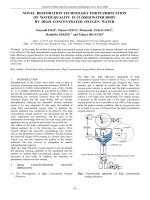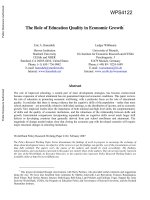Demanding work the paradox of job quality in the affluent economy
Bạn đang xem bản rút gọn của tài liệu. Xem và tải ngay bản đầy đủ của tài liệu tại đây (4.88 MB, 252 trang )
DEMANDING WORK
DEMANDING WORK
THE PARADOX OF JOB QUALITY IN
THE AFFLUENT ECONOMY
Francis Green
PRINCETON UNIVERSITY PRESS
PRINCETON AND OXFORD
Copyright © 2006 by Princeton University Press
Published by Princeton University Press, 41 William Street, Princeton, New Jersey 08540
In the United Kingdom: Princeton University Press, 3 Market Place, Woodstock,
Oxfordshire OX20 1SY
All Rights Reserved
Second printing, and first paperback printing, 2007
Paperback ISBN: 978-0-691-13441-3
The Library of Congress has cataloged the cloth edition of this book as follows
Green, Francis.
Demanding work : the paradox of job quality in the affluent economy / by Francis
Green.
p. cm.
Includes bibliographical references and index.
ISBN 0-691-11712-8 (hardcover: alk. paper)
1. Quality of work life. 2. Job satisfaction. 3. Work—Social aspects. I. Title.
HD6955.G717 2006
331-25'6—dc22
2005006272
British Library Cataloging-in-Publication Data is available
This book has been composed in Sabon
Printed on acid-free paper. ∞
press.princeton.edu
Printed in the United States of America
10
9
8 7
6
5
4 3
2
This book is dedicated to my mother, Rosamund, to my late
father, Keith, and to Alison, Daniel, Robert, and Toby
Contents
List of Illustrations
xi
Preface: The Quest for “More and Better Jobs”
xv
Acknowledgments
Abbreviations
One
Assessing Job Quality in the Affluent Economy
The Paradox of Job Quality at the Millennium
Revealing a History of the Present
The Changing World and the Everyday Workplace
What Makes a Good Job?
An Interdisciplinary Perspective on Job Quality
From Quality of Work Life to “Quality in Work”?
How to Measure a Good Job: Surveys of the Quality of
Work Life
Two
The Quality of Work Life in the “Knowledge Economy”
An Optimistic Outlook
Theories of the Changing Demand for Skill
The Concept and Measurement of Skill
The Rising Level of Skill
Skills Polarization?
Skill, Technology, and Work Organization
The Skills Balance
Conclusion: A Mixed Verdict
Three
Late Twentieth-Century Trends in Work Effort
Working Hours, Work Effort, and the Quality of
Work Life
The Concept and Measurement of Work Effort
Work Intensification in Britain
Work Intensification in Europe, Australia, and the
United States
Any Objections?
Conclusion: A Summary of Effort Trends
xxi
xxiii
1
1
3
5
8
13
19
22
24
24
26
28
29
35
37
40
42
44
44
47
50
58
61
64
viii
CONTENTS
Four
Accounting for Work Intensification
The Paradox of Work Intensification in the Affluent Economy
The Supply of Effort
“Amber Lights” and Effort-Biased Technological Change
Big Brother
The Changing Balance of Power
The Stick, the Carrot, and the Smooth Sell
Conclusion: The Role of Technological Change
Appendix: Multivariate Analyses
66
66
67
69
77
78
81
84
86
Five
Workers’ Discretion
The Importance of Influence
The Workers’ Voice
Theory about How Discretion Is Changing
Trends in Discretion
Conclusion: An Incomplete Account
94
94
98
99
102
107
Six
The Wages of Nations
Wages and the Fairness of Wages
The Growth of Average Wages
The Fairness of Wages
Conclusion: Alright for Some
111
111
112
119
123
Seven
Workers’ Risk
Is This an Age of Uncertainty in the Workplace?
The Concept and Measurement of Job Insecurity
Workers’ Perceptions of the Trend and Distribution of
Job Risk
Objective Proxies for Risk
Conclusion: Risk and the Quality of Work Life
Eight
Workers’ Well-Being
A Question of Well-Being
A Digression on the Notion of Subjective Well-Being
A Picture of the Changing Well-Being of Workers in the
Industrialized World
Well-Being and the Quality of Jobs
Conclusion: The Quality of Work Life Is Strained
Appendix: Multivariate Analyses
126
126
130
131
142
146
150
150
151
153
160
166
168
CONTENTS
ix
Nine
Summary and Implications for Policy on the
Quality of Work Life
The Rewards and Demands of Work in the
Affluent Economy
Policy Implications
170
178
Data Set Appendix
185
Notes
193
References
203
Index of Names
219
General Index
223
170
List of Illustrations
Figures
2.1. Proportion of Jobs Requiring College-Educated Labor:
United States, 1969 and 1985; Germany, 1985 and 1997;
Britain, 1986 and 2001
2.2. Over-qualification in Britain, 1986–2001
3.1. Hard Work in Britain, 1992 and 2001
3.2. Work Intensification in Europe during the 1990s
5.1. Task Discretion in Finland, 1984, 1990, and 1997
5.2. Task Discretion in Britain, 1992, 1997, and 2001
6.1. Real Hourly Wage Index in 18 OECD Nations,
1970–2000
6.2. Economic Growth and Real Wages Growth in
OECD Nations
6.3. Changes in Wage Dispersion in 16 OECD Nations
during the 1980s and 1990s
7.1. Press References to Job Security and Insecurity,
1980–2002
7.2. Perceived Risk of Job Loss, Britain, 1986, 1997, and 2001
7.3. Perceived Risk of Job Loss and Aggregate Unemployment
Rate, United States, 1977–2002
7.4. Perceived Risk of Job Loss and Aggregate Unemployment
Rate, Germany, 1985–1998
7.5. Perceived Difficulty of Re-Employment, Britain and
the United States
7.6. Perceptions of Insecurity in Eight Nations, 1989 and 1997
8.1. Job Satisfaction in Britain, 1972–1983 and 1992–2001
8.2. Work Strain in Britain, 1992 and 2001
8.3. Job Satisfaction in Germany, 1984–2001
8.4. Job Satisfaction in the United States, 1973–2002
8.5. Job Satisfaction of Full-Time Employees in Europe,
1994–2000
34
41
55
59
103
104
115
118
121
127
134
135
136
139
141
154
156
157
157
159
xii
L I S T O F I L L U S T R AT I O N S
Tables
1.1.
2.1.
2.2.
2.3.
2.4.
3.1.
3.2.
3.3.
3.4.
3.5.
3.6.
3.7.
3.8.
3.9.
3.10.
4.1.
4.2.
4.3.
4.4.
A4.1.
A4.2.
A4.3.
A4.4.
A4.5.
5.1.
5.2.
Dimensions of “Quality in Work,” according to the
European Commission
Ways of Measuring Workplace Skills
Trends in Qualification Requirements, Germany,
1985–1997
Trends in Broad Skills, Britain, 1986–2001
Computers and the Rise in Skill Demand,
Britain, 1986–2001
Average Annual Hours Actually Worked per Employed
Person
Effort Change, 1981–1986
Effort Change, 1987–1990
Effort Change, 1987–1992
Work Effort in Britain, 1992, 1997, 2000, and 2001
Effort Change, 1993–1998
Trends in Effort Pressures on Employees, 1986–2001
Work Effort in Europe in 1991, 1996, and 2000,
by Country
Effort Change in Australia, 1993–1994
Pay Premia for Hard Work
Effort Intensification in Britain, 1993–1998,
by Technical/Organizational Change
Effort Intensification in Britain, 1987–1990,
by Technical/Organizational Change
Effort Intensification in Australia, 1993–1994,
by Technical/Organizational Change
Effort Intensification in Britain, 1996–2001,
by Technical/Organizational Change
Determinants of Effort Intensification in Britain,
1993–1998
Determinants of Effort Intensification in Britain,
1987–1990
Determinants of Work Intensification in Australia,
1993–1994
Determinants of Effort Intensification in Britain,
1996–2001
Determinants of Effort Intensification in Britain,
1992–2001: A Cohort Analysis
Employees’ Discretion and Choice in Britain’s Workplaces,
1986–2001, by Occupation
Changes in Discretion in Europe’s Workplaces, 1996–2000
21
30
32
33
38
46
51
52
53
54
56
57
60
61
63
74
75
75
76
87
89
90
91
93
105
106
L I S T O F I L L U S T R AT I O N S
Discretion and Advanced Technology within Cohorts,
1992–2001
6.1. Growth of Real Compensation per Employee in the
Business Sector in 24 OECD Nations, 1975–2002
6.2. Relative Hourly Compensation of Manufacturing
Production Workers, 1979, 1989, and 2000
7.1. Job Loss by Prior Fear of Job Loss
7.2. Job Insecurity Scale in Britain, by Sex, 1986,
1997, and 2001
7.3. Indices of Job Insecurity and Difficulty of Re-Employment
by Sex, Job Contract, Sector, Industry, and Occupation,
1986–2001
7.4. Summary of Evidence on Trends in Job Insecurity
8.1. Job Satisfaction in Seven Industrialized Nations,
1989 and 1997
8.2. Correlation between Within-Cohort Changes in Job
Satisfaction and Within-Cohort Changes in Job
Characteristics over 1992–2001
A8.1. Within-Cohort Analysis of Job Satisfaction, Britain,
1992 and 2001
xiii
5.3.
108
117
120
132
133
137
147
155
163
169
Preface
The Quest for “More and Better Jobs”
The last quarter of the twentieth century saw the creation of nearly a
hundred million jobs in the labor markets of the advanced industrialized
world. This achievement, in which every economy shared, testifies to the
apparently enduring power of capitalism to generate the prospect of
paid work for the citizens of rich nations. Yet what has been happening
to the quality of work life experienced by the people doing these abundant jobs? Has the affluent economy, with rising material living standards, yielded a better work life for most of us? If not, why not? This
book aims to answer these questions, as far as is currently possible,
using the tools of the economist and with considerable help from other
social sciences. It shows that job quality has indeed risen in certain respects: the average job pays higher wages and uses more skills. However,
in other respects the quality of work life has become worse: wages have
become much more unequal, work effort has been intensified and, at
least in Britain, employees are more likely to be overqualified for the
kind of work they do, while their influence over their daily work tasks
has been diminished.
Such findings ought to arouse some concern for policy makers in developed economies. For much of the past twenty years, the main objective has been to create jobs and reduce unemployment. Since the turn of
the century, however, the quality of work life has crept into the policy
agenda. The rhetoric of national governments and supranational organizations now favors improvements in job quality as well as in the numbers employed. The Council of the European Union, following its meeting at Lisbon in spring 2000, declared that, as part of its long-term aim of
becoming the most advanced economy in the world by 2010, it needed to
prioritize the “quality of work.” It set its civil servants the task of defining indicators of quality that could become the targets of European-led
policy-making in member countries.1 It was felt that a fuller evaluation
of employment policies should include whether the jobs generated are
satisfying and have some promise of extension and betterment, rather
than being of the “dead-end” variety. Similar themes have been taken up
by the International Labour Office, which has developed a concept of
“decent work,” and by the Organization of Economic Cooperation and
Development which in 2003 sponsored a conference of employment
xvi
PREFACE
ministers with the theme of moving toward “more and better jobs.” An
important catalyst for the new interest in quality was the somewhat reduced unemployment levels to be found in the United States and some
European countries. The logic is that, once sufficient jobs have been generated, the next task is to concentrate on improving the quality of those
jobs. Interest may also have stemmed from the widespread publicity afforded to problems of workplace stress, job insecurity and, for substantial minorities, persistent low pay.
My own interest in arriving at an improved understanding of the quality of work life was aroused in the mid-1990s by a widespread public
perception that conditions for the workers of advanced economies had
been deteriorating. In the harsh new world of global competition, life at
work seemed in the eyes of many to be getting worse. In Britain, where I
live, work stress became the occupational health hazard of the last decade. There was widespread talk of “time-famine” and other metaphorical allusions to how the increased demands of work life spilled over
to other parts of life, so dislodging the “work-life balance.” In the United
States, employees were said to be caught in a “time squeeze,” and work
was “becoming nasty, brutish, and long.”2 Yet the phenomenon was not
confined to the liberal market economies: an intensification of work effort and its consequences were being bemoaned almost everywhere I
looked across the industrialized world. Work intensification, moreover,
has been only one item of complaint: other concerns have included rising
wage inequality in the majority of countries, and perceptions of decline
in the numbers of career jobs that offered security and promotion
prospects, at least for those lucky enough to get on the inside track. A
substantial minority of the new jobs being created had the worst of all
worlds, offering low pay, no prospects, insecurity, and tedious, hard
work—in short, drudgery. This picture fits well with the more pessimistic and critical ideologies about global capitalism in modern times.
It seemed a fairly dismal scenario, then, which the official concern with
“better jobs” was set to confront at the start of the new millennium.
Yet this picture of work degradation presents an extraordinary paradox, considering that this has been an era of affluence and continued economic growth. The time may come when environmental degradation will
require an accommodation to declining living standards—let us hope a
peaceful one—but looking back over the past quarter century we see only
rising affluence, on average, in the already-rich world. If it is true that the
quality of work life is in serious decline, while the economy as a whole—
at least as measured by the conventional standards of welfare—is becoming even more affluent, we surely have some explaining to do. After all,
for many people work is an important part of their life: why not devote
THE QUEST FOR “MORE AND BETTER JOBS”
xvii
part of that affluence to improving the quality of jobs, as well as to buying better cars and washing machines?
One explanation might be that the popular portrayal of a deteriorating workplace is simply false. Purveyors of the dismal-workplace scenario could be accused of suffering from a distorted memory of how unpleasant work life used to be—forgetting how low were the wages, how
short the holidays, and how unsafe the working conditions. Horrific accidents at work are sometimes given proper publicity, but the tragedies
of earlier industrial disasters are hidden in the mists of time. The numerous workers chained to assembly lines in earlier generations can hardly
be said to have enjoyed fulfilling work lives. With the articulation of
these opposing descriptions of reality, all too easily there follows next a
pantomime of the ideologies. Optimistic and pessimistic declarations
about whether work life is getting better or worse are counterposed with
little or no evidence in support.
Addressing factual disputes about how the world of work is changing
is one vital manner in which the labor-economist scholar should enter
the stage. The first objective of this book, then, is to construct a reliable
account of the extent to which different key facets of work life are
changing. The concept of job quality, for this purpose, will be entirely
worker-centered. Skills, effort, discretion, wages, and risk are the main
focal points, as dictated both by theories of the sources of well-being at
work and by available evidence. The indicators I shall use are primarily
quantitative.
The second objective of the book is to seek understanding of the
sources of change in job quality. I construct an account of how some aspects of job quality have been changing in terms of wider socioeconomic
movements. Making links between the world of work and the broader
political economy is not uncommon practice in popular discourse. Here,
by using formal methods, I am able to begin to assess more comprehensively the importance of technical and organizational changes and of
politico-economic developments such as the decline of union power, and
to evaluate the role of modern management practices.
The conclusions should be of interest to social analysts and policy
makers, as well as to economists. There will be some among my disciplinary colleagues who will feel that the changing quality of work life is
an improper subject for investigation in a hard science, primarily because a good deal of the empirical base is drawn from subjective reports
of workers about their jobs. Such data, it will be alleged, are so full of
biases and errors as to be worthless. To any such critics—if they are not
my own imaginary “straw men”—I respond with two points. First,
complete distrust of the individual is absurdly misplaced: what is
xviii
PREFACE
needed is a measured and critical approach, which draws on the contributions of fellow social scientists in designing instruments of work measurement, who are equally aware of the pitfalls of invalid or unreliable
instruments. Second, trying to understand the sources of well-being at
work is exactly what labor economics should, ultimately, be about. Implicitly much of it already is, through its many analyses of wage determination. But pay is not all there is to jobs. There is a parallel here with
recent debates about “happiness” in economic life. Proponents and
practitioners of “happiness” studies also assert that they are doing precisely what economics should be concerned with: explaining what
makes people better off, not just what makes them wealthier in material
riches. I devote one chapter of this book specifically to the understanding of national trends in job satisfaction, which is sometimes quaintly
referred to as “happiness at work.” Elsewhere I am concerned with aspects of job quality which are central to theories that link the quality of
work life to human needs.
A lot can now be said about these aspects of work life. Though the
picture of change is a long way from being comprehensive across the industrialized world, scientific study of these aspects of work life has been
made possible, if still in a somewhat halting fashion, by the arrival of the
high-quality social survey. It is not too fanciful to liken the arrival of this
new tool of enquiry to the invention of a scientific instrument or technique in any of the natural sciences. As is well known, new instruments
can sometimes transform both its knowledge base and the way a science
is carried out. The social survey is not quite at that stage because its application has, as yet, been too piecemeal. Nevertheless, as I hope to
demonstrate, a lot can be learned from social surveys about the workplaces of the late twentieth century industrialized world with what we
already have at our disposal. The social survey series is a qualified triumph of interdisciplinary social science, whose wider value is yet to be
fully recognized. Unfortunately, too little of this material is multinational in scope.
There are some provisos. First, the information contained in social
surveys about the quality of work life is in many cases quite constrained.
This limitation has come about, I believe, because labor sociologists and
economists have lacked influence (or the will to participate) in the design
of nationally representative social surveys. Considering the importance
of work in most people’s lives, our high-quality surveys ask remarkably
little about this domain. A second proviso is that the quality of the survey itself is of prime importance. Some readers may be surprised to see
the virtues of the social survey paraded, knowing the large number of
poorly conducted surveys that have grown up to serve particular interests of immediate local or commercial concerns. This, however, is where
THE QUEST FOR “MORE AND BETTER JOBS”
xix
the independent analyst contributes, by selecting only properly conducted surveys whose value should not be undermined by the purveyors
of cheap survey findings or those contaminated by self-interest.
Good-quality surveys, with support from administrative data, enable
us to settle many of the intriguing issues about job quality in the modern
era. As I shall show, we can be confident that there has been an increase
in the average skill level of jobs in recent decades, even though there remains a very substantial tranche of nonroutine, low-skilled jobs which in
some countries is rising in proportion to the totality of jobs. In most
countries wages have risen, giving workers a share of economic growth
(the United States is a major exception). The risk of accidents has been
diminishing. These developments appear to vindicate the optimistic perspective about work in modern advanced capitalism, and can be accounted for by the progress of technologies, by successful economic
growth, and by more enlightened interventions by governments.
Set against these pluses, however, the survey series confirm the intensification of work effort in many countries. The surveys support evidence,
moreover, of a robust association between effort change and technical
and organizational innovations at the workplace. In Britain, there has
also been a distinct trend toward reduced personal autonomy in the
workplace. It might seem easy to brush aside such a finding, but it is
likely that economists have underestimated the direct importance for
well-being of exercising personal influence at work. The deteriorations
in autonomy and the intensification of work lie behind an observed decline in the job satisfaction and affective well-being of British workers,
even while their wages have been rising. The job satisfaction of German
workers has also declined, and virtually nowhere is there a sign of workers gaining in satisfaction.
Survey data series are also of considerable use for elucidating our understanding of job insecurity in the modern age. Contrary to a good deal
of popular commentary, the surveys do not reveal a secular increase in
insecurity in the modern era. Rather, they confirm what one might
naively predict, that the public’s perception of the security of their jobs
largely tracks the state of the aggregate labor market. When the aggregate unemployment rate is low, few people fear for their job. In the mid1990s, however, a somewhat disproportionate share of workers were
feeling insecure in both the United States and Britain—particularly many
middle-class, well-educated workers. This broadened perception of insecurity retreated as expected in the late 1990s with the booming economy.
The pessimistic aspects of the findings I am going to report make the
new official search for “better jobs” at once timely and, given the evolution of an increasingly competitive global economy, quite problematic.
xx
PREFACE
Though an economist, I have drawn on the wisdom of other social sciences, especially from sociologists and psychologists who have been
writing about the quality of work life for many decades. I shall contrast,
but also interweave, some different perspectives on the quality of work
life, and use them collectively to generate an interdisciplinary account of
how and why various aspects of quality of work life have been changing
in recent decades. If I am successful, my economist readers will perhaps
be stimulated to think further about the processes of valuation and
change in work life, and to join with all labor analysts to press for continual improvements in the available data. For my readers from other social sciences, especially in the field of labor sociology, this book offers
some new answers to old questions, using the basic tools of economics
applied to medium and large nationally representative data sets. In so
doing, I hope the book will further the case for quantitative studies in
the field of sociology, not as a substitute for high-standard qualitative investigations or ethnographic research of work processes, but as a complement to these differing methodologies. For policy makers intent on
designing policies to influence the world of work, an accurate summary
account of change should be indispensable.
No one book, with such a broad canvas, could do more than paint a
general picture of the most important workplace changes and to link
particular developments with the wider transformations of the international economy. My scope, however, has been especially constrained by
the relative scarcity of material for its chosen method. As a result, a preponderance of the discussion in this book concerns Britain, which for
many purposes has some of the richest survey-based data series for the
study of work life. Elsewhere the book goes where the data are, to say
what it can about work-life changes in modern industrialized economies.
It is hoped to contribute not only by enhancing understanding of the last
quarter century, but also by demonstrating the value of the method, and
so stimulating wider and more regular support of high-quality, surveybased research on life at the workplace. If successful, accounts that attempt a similarly wide perspective on workplace change in the next two
decades could both be more comprehensive and have a broader geographical scope. For the present, I have largely used whatever goodquality survey series I could find. Doubtless there are and will be more,
which can only bode well for the future of research into the quality of
work life.
Acknowledgments
Though i wrote this book myself, many of its constituents have been a
collective endeavor. Alan Felstead collaborated with me in developing
both the 1997 and 2001 Skills Surveys and many subsequent analyses.
Duncan Gallie shared equally in the design and management of the 2001
Skills Survey, much of which drew on his earlier experience designing the
Employment in Britain survey of 1992 and the Social Change and Economic Life Initiative of 1986. David Ashton has also been an important
co-researcher on skills and education around the world. I owe these three
an enormous intellectual and practical debt. Others have taken great
trouble to read and comment on various drafts, including Paul Auerbach,
Alan Carruth, Peter Skott, and Yu Zhu and three anonymous referees. To
all of these people I give my thanks. I have also benefited greatly from excellent research assistance provided by Nicholas Tsitsianis.
Surveys nowadays are usually made available for public use by researchers, at some decent interval after they have been collected. The
processes of depositing and retrieving data are immeasurably more fluent, and my task that much easier, than it would have been even a decade ago. The contribution of the many anonymous data archivists in
harnessing new technology to enable this transformation deserves recognition. Funding sources for all surveys used are noted in the Data Set Appendix. For some of the surveys I also owe more direct acknowledgments. For funding the 2001 Skills Survey, on which several of the
British-based analyses are founded, thanks are due to the U.K. Department for Education and Skills. The U.K. Economic and Social Research
Council is acknowledged and thanked for its funding of the 1997 Skills
Survey as part of its “Learning Society” program of research and, with
regard to the material used in chapter 8, its funding of the project “Understanding Trends in Job Satisfaction.” The ESRC is also indirectly responsible for support given me through its Research Centre at Oxford
and Warwick Universities “Skills, knowledge and Organisational Performance,” whose director, Ken Mayhew, has been a recurring source of
encouragement and a generator of independent ideas about Britain’s
work environment. The Leverhulme Trust awarded me a Personal Research Fellowship in 1999, and it was this that enabled me to carry out
most of my initial analyses of the intensification of work effort in
Britain. Both the Skills Surveys were carried out professionally under the
direction of Jon Hales at the National Center for Social Research, and I
am grateful to him and his colleagues for their always courteous and
xxii
ACKNOWLEDGMENTS
thoughtful approach to survey management. More grandly I also thank
the countless workers across many nations who took time to respond to
surveys—an apparently selfless activity whose tedium appears only to be
mitigated occasionally by the pleasure of talking to others about one’s
work. Their personal reports are, collectively, the lenses through which
we social scientists can better understand the evolution of modern work
life.
List of Abbreviations
EPI
EU
GDP
HRM
ICT
ILO
OECD
Effort Pressure Index
European Union
Gross Domestic Product
Human Resource Management
Information and Communications Technology
International Labor Office
Organization for Economic Cooperation and Development
For abbreviations of data sets, see Data Set Appendix.









